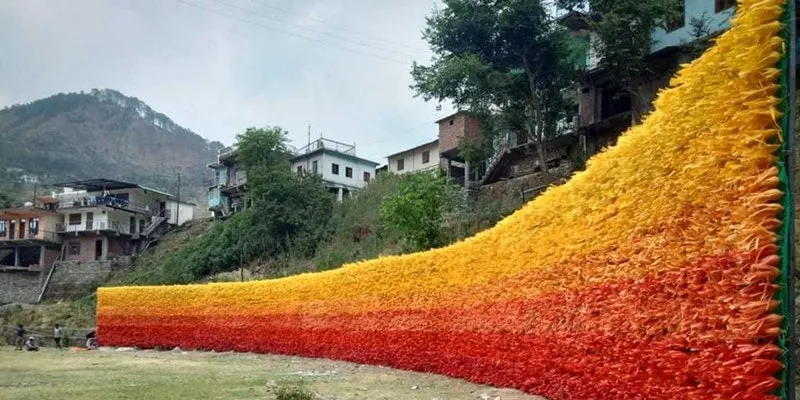Made of 15,000 plastic bottles, Mussoorie’s Wall of Hope reminds tourists to join the fight against plastic pollution
In an attempt to revive the lost glory of The Queen of the Hills, Mumbai-based Recity Network has collaborated with Scrambling Adventures, Nestle India, and Museum of Goa Foundation to collect and dispose of plastic waste. Their installation sends out a strong message: don’t litter.
Located in the foothills of the Garhwal Himalayan range, Mussoorie has been a popular destination since the time the British ruled India. The Queen of Hills, known for its verdant greenery and peaceful ambience, is home to 30,000 people and attracts more than three million tourists annually.
The tourist influx and modern life have left the scenic town choking with plastic waste, be it bags, bottles, or other disposables. But the hill station and its people are fighting back. An unusual installation, titled the Wall of Hope, has been constructed using 15,000 plastic bottles near Mussoorie.
The 150-foot-long and 12-foot-high wall, located at Bunglow ki Kandi village, was unveiled in mid-June. The structure was built as a part of the Hilldaari project, which aims to increase awareness about plastic waste management and the importance of creating a plastic-free environment.

The Wall of Hope was unveiled in mid-June as part of the Hilldaari project that aims to raise awareness about plastic waste management.
Keen to revive the lost glory of the hills, Recity Network and Nestle India came together and initiated a movement called Hilldaari, to make Mussoorie one of the cleanest hill stations of the country. The idea behind this initiative was to “instil a sense of responsibility and ensure efficient waste management”.
The Wall of Hope
The Hilldaari team, which has been regularly organising cleanup drives across Mussoorie till now, collaborated with Museum of Goa Foundation, which aims to take art to the masses for this project. More than 50 volunteers from schools and colleges across the hill station contributed towards building this wall over two months.
Mayank Tandon, Manager, Recity Network, and a member of Hilldaari movement, says,
“There needs to be change in the behaviour of people visiting Mussoorie. It’s for this that this installation that depicts the harsh reality has been put up. It will serve as a constant reminder of how tourist ills are plaguing the hill station, and we hope it will lead to responsible tourism.”
Speaking about the wall, he adds: “Most of the time went in collecting plastic water bottles. We collected them in three ways. We collected bottles from 16 hotels across Mussoorie. We also purchased some bottles from six ragpickers at a cost of Rs 20 per kg against their usual price of Rs 30 per kg. And then, we collected bottles through our cleanup drives.”
The team strictly avoided using the conical shaped bottles as it did not lend itself to the planned structure.

More than 50 volunteers from schools and colleges across the hill station contributed towards building the Wall of Hope over two months.
Speaking about the team, Mayank says, “We are only four members from the Hilldaari team here. Most of the work was done by the 50-plus volunteers. Surprisingly we had two volunteers from Mumbai, who took care of the project.”
Two dedicated design volunteers focused on getting the design right, while other students cut and painting the collected bottles. Apart from the involvement of students, many locals from Bungalow ki Kandi village came forward to support the cause. The municipality and gram panchayat proved to be a great support and helped the team extensively.

Women from the community helped the team in preparing the collected discarded bottle for the wall of hope
As Dr Subodh Kerkar, Founder of Museum of Goa Foundation, says,
“The installation draws structural strength from the steel pillars fixed two feet deep into the ground. We have created a prototype in Goa, and the structure is completely rain and windproof.” He adds that the installation complements the serene background of the hills.
Speaking about the reaction of people to the wall, Mayank says,
“Everyone was quite surprised to see that something so beautiful can be made from plastic. Many were seen taking selfies and uploading pictures on their social media accounts.”
Cleaning up the hills
The idea for the Hilldaari movement wall was seeded six months ago. Till date, the team has achieved 90 percent waste segregation in six wards of the city. The team includes various stakeholders like Nagar Palika Parishad, waste workers, citizens’ groups, local media channels, and NGOs like KEEN and Scrambling Adventures.
Cleanliness drives are carried out once or twice a month. The initiative has seen 18 cleanup drives till now, with around 60 kg of waste being collected each time.
The collected waste is processed by Keeping the Environment Ecologically Natural (KEEN), which has been processing waste for the past 25 years. The organisation stores the waste in different containers after segregation, and then recycles as much as possible.
Greening the future
The team is now in talks with the Government of Uttarakhand to build infrastructure across Mussoorie to ensure that tourists dispose waste properly.
Recognising the need for efficient plastic waste management, Nestlé India in collaboration with Gati Foundation, a Dehradun-based environmental action and advocacy group, in May and launched a project in Dehradun and Mussoorie.
A mobile van named Plastic Express travels across the towns, visiting the many Maggi points and collecting plastic waste. The year-long project aims at connecting with around 200 shops in the hill towns for collecting and disposing of plastic waste responsibly.
With the support of Nestle, the team has been able to send around six tonnes of low-value plastic, which is used in for packaging chips and noodles, to Delhi. The multi-layered plastic waste, which cannot be recycled, will be disposed of responsibly by Nestle.
Highlighting the work of waste workers
Despite the growing awareness regarding indiscriminate plastic pollution and the many cleanup drives and initiatives, most of us ignore the efforts of waste workers and ragpickers. These people tirelessly clean up the mess we create and segregate it so that it doesn’t end up in open spaces or near our house.
To give these workers the respect they deserve, an artist from the Museum of Goa has been drawing mammoth graffiti on walls across the city under a project called 'Deewaron Par Dastak' (Knock on the Wall).
Mayank says, “Different types of workers are involved in this entire cleaning process, from sanitation workers to municipality workers. We are now looking at how their life can be made better by introducing a few new provisions for them.”
(Edited by Teja Lele Desai)









